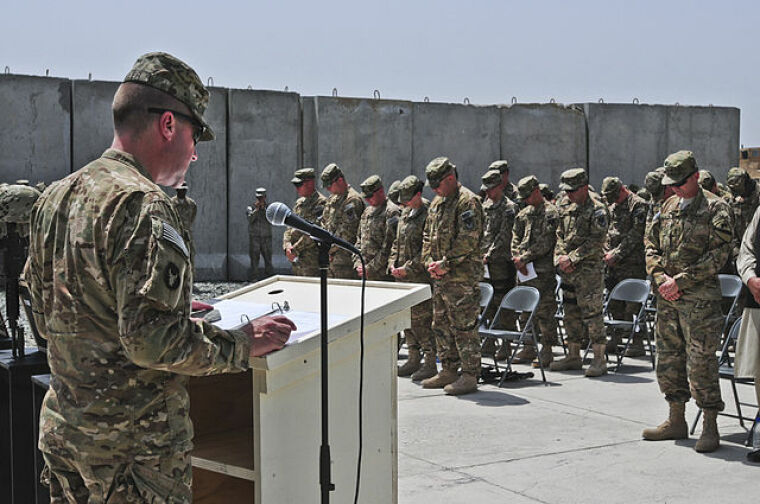Chaplains resist secularist efforts to ban prayers at Air National Guard Base

A group of chaplains is resisting an atheist organization's efforts to put an end to prayers and Bible readings at the Air National Guard base in New Hampshire.
Last month, the Freedom From Religion Foundation (FFRF) sent a letter to Lt. Col. Thaddeus Day at Pease Air National Guard Base, saying the inclusion of chaplain-led invocations and Scripture readings at official Air National guard ceremonies is unconstitutional. The group claimed that the letter was sent on behalf of a concerned guardsman who complained about the invocations.
The letter argued that the Supreme Court mandates that the government maintain neutrality toward religion and called on Day to end the practice of prayers and Scripture readings at official events, according to The Christian Post.
The FFRF also asserted that the inclusion of prayers is "unnecessary and divisive," adding that military members are "free to pray privately or to worship on their own time."
In response to the atheist group's letter, the Chaplain Alliance for Religious Freedom, a coalition of over 30 agencies that endorse over 2,600 military chaplains, enlisted the help of the Texas-based law firm First Liberty Institute.
On Tuesday, the First Liberty Institute sent a letter to Col. James Ryan, the commanding officer at Pease Air National Guard Base, to advise him that there is "no legal requirement" for him to yield to the demands of the FFRF.
"Their demands appear to be based on the flawed notion that military chaplains cannot offer invocations at ANG functions. The FFRF's position and legal argument are incorrect," First Liberty senior counsel Mike Berry wrote. "Federal law, military regulations, and court precedents belie the FFRF's specious claims," he added.
Berry pointed to the Religious Freedom Restoration Act to argue that the military and government are not allowed to hinder an individual's religious exercise unless there is a "compelling government interest" to do so.
He also cited the National Defense Authorization Act, which stated that the Department of Defense "must accommodate individual expressions of religious belief, which undoubtedly include a military chaplain's invocation."
"Contrary to the FFRF's assertion, there is no exception when such individual expressions occur during military functions," he continued.
Berry also noted a 1997 federal court ruling in Rigdon v. Perry, when the U.S. District Court for the District of Columbia upheld the rights of two chaplains who wanted to preach in favor of banning partial-birth abortions. He contended that the ruling affirms that the religious conduct of chaplains is protected under the First Amendment.
Berry asserted that the U.S. Constitution, federal law, and Department of Defense regulations all support the practice of permitting uniformed chaplains to offer invocations at official functions. He further noted that military commanders are actually forbidden from censoring and prohibiting such invocations.
 Christians don't have to affirm transgenderism, but they can’t express that view at work: tribunal
Christians don't have to affirm transgenderism, but they can’t express that view at work: tribunal Archaeology discovery: Medieval Christian prayer beads found on Holy Island
Archaeology discovery: Medieval Christian prayer beads found on Holy Island Presbyterian Church in America votes to leave National Association of Evangelicals
Presbyterian Church in America votes to leave National Association of Evangelicals Over 50 killed in 'vile and satanic' attack at Nigerian church on Pentecost Sunday
Over 50 killed in 'vile and satanic' attack at Nigerian church on Pentecost Sunday Ukrainian Orthodox Church severs ties with Moscow over Patriarch Kirill's support for Putin's war
Ukrainian Orthodox Church severs ties with Moscow over Patriarch Kirill's support for Putin's war Islamic State kills 20 Nigerian Christians as revenge for US airstrike
Islamic State kills 20 Nigerian Christians as revenge for US airstrike Man who served 33 years in prison for murder leads inmates to Christ
Man who served 33 years in prison for murder leads inmates to Christ


 Nigerian student beaten to death, body burned over ‘blasphemous’ WhatsApp message
Nigerian student beaten to death, body burned over ‘blasphemous’ WhatsApp message 'A new low': World reacts after Hong Kong arrests 90-year-old Cardinal Joseph Zen
'A new low': World reacts after Hong Kong arrests 90-year-old Cardinal Joseph Zen Iran sentences Christian man to 10 years in prison for hosting house church worship gathering
Iran sentences Christian man to 10 years in prison for hosting house church worship gathering French Guyana: Pastor shot dead, church set on fire after meeting delegation of Evangelicals
French Guyana: Pastor shot dead, church set on fire after meeting delegation of Evangelicals ‘Talking Jesus’ report finds only 6% of UK adults identify as practicing Christians
‘Talking Jesus’ report finds only 6% of UK adults identify as practicing Christians Mission Eurasia ministry center blown up in Ukraine, hundreds of Bibles destroyed: 'God will provide'
Mission Eurasia ministry center blown up in Ukraine, hundreds of Bibles destroyed: 'God will provide' Church holds service for first time after ISIS desecrated it 8 years ago
Church holds service for first time after ISIS desecrated it 8 years ago Burger King apologizes for 'offensive campaign' using Jesus' words at the Last Supper
Burger King apologizes for 'offensive campaign' using Jesus' words at the Last Supper Uganda: Muslims abduct teacher, burn him inside mosque for praying in Christ’s name
Uganda: Muslims abduct teacher, burn him inside mosque for praying in Christ’s name